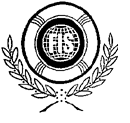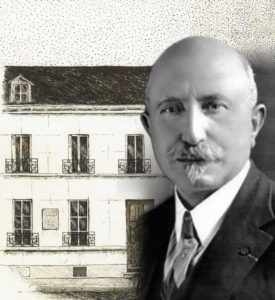FIS was founded on 27 March 1910 in Saint-Ouen, a small city near Paris, in France. Foundation nations included Belgium, Denmark, France, Great Britain, Luxembourg and Switzerland.

FIS Logo
At the end of the 19th century, several national life saving organisations were collaborating with similar organisations abroad. In 1878, under the leadership of French Lifesaving Associations, an International Lifesaving Congress was organised in Marseille, a city in the South of France. This Congress was, for the time being, a big success and was the start of the willingness to create an international forum on lifesaving.
Since that time, the contacts between the several lifesaving bodies never were interrupted. In the following years, similar Congresses took place but did not immediately lead to the creation of one single International Lifesaving Federation.
Mr. Raymond Pitet, the President of the French Lifesaving Federation, did not give up the idea and organised in 1900, at the occasion of the World Fair in Paris, a lifesaving congress with a principal tool to create an International Life Saving Federation, but did not succeed.
In 1910, Paris suffered from many inundations and lifesavers from over Europe came to help. These gestures of solidarity among people was one of the reasons for Mr. Raymond Pitet to convene again a new congress in the same year in Saint-Ouen, a small city in the neighbourhood of Paris.
At this gathering the “Fédération Internationale de Sauvetage (FIS)” was founded by the following countries: Belgium, Denmark, France, Great Britain, Luxembourg and Switzerland. Spain and Italy, who could not be present, also supported the creation of the International Federation.
The seat of the FIS was decided to be Paris in France.

Mr. Raymond Pitet – Founder of FIS
In the following years congresses and championships took place in European countries but the first World War stopped the expansion of the International Federation.
Between the two World Wars, attention was not only given to water rescue but also to road and mountain rescue services. After the second World War, the French Federation again started to link the lifesaving federations to each other by initiating the organisation of a congress in Lausanne (Switzerland) where new resuscitation techniques were studied.
This last congress was the main injection to start again the international work. In 1951, a World Congress on life saving was organised in Cannes (France) with the presence of representatives from 22 countries. At that moment the French delegation organised the first Lifesaving World Championships and lifesaving demonstrations.
The result of the Congress was that the representatives agreed to organise in Paris a Constitutional meeting in order to update the statutes of FIS with the aims and objectives of an International Body. This last meeting, which has to be considered as the reborn of FIS, took place on 6 February 1952 in Paris.
At this meeting the new organisation received the name “Fédération Internationale de Sauvetage et de Secourisme et de Sports Utilitaires”(International Federation on Lifesaving, Rescuing and Utility Sports). This name was kept till 1963 where it was changed to “Fédération Internationale de Sauvetage et de Sports Utilitaires” (International Federation on Lifesaving and Utility Sports).
The “Secourisme” aspects were considered to be included in the word “Sauvetage”. The official abbreviation was FIS and the official logo was a lifesaving buoy with the letters FIS on a World Map. Under the buoy, laurier branches were placed. In 1985 FIS again modified its statutes and its name became: “Fédération Internationale de Sauvetage Aquatique”.
The main aims of FIS was to develop and assist all institutions who care on all aspects of lifesaving, such as aquatic rescue, divulgation of scientific aspects and didactic principles within these organisations in order to better physical education and sport of lifesaving.
On 24 February 1993, FIS merged with WLS to form the International Life Saving Federation (ILS). At that time, FIS represented more than 30 full member national life saving organisations.
Former Presidents of FIS
- 1910 – 1951 – Raymond PITET (France) *
- 1951 – 1958 – MANAUT (France) *
- 1959 – THOMSEN (Germany) *
- 1960 – Martel VINIEGRA (Spain) *
- 1961 – HENGEN (Luxembourg) *
- 1962 – Rodolfo PASSERINI di Finale (Italy) *
- 1963 – MANAUT (France) *
- 1964 – 1965 – Mohamed ABDALLAH (Algeria) *
- 1966 – 1968 – Rodolfo PASSERINI di Finale (Italy – FINS)*
- 1969 – 1983 – José Antonio de PASQUAL (Spain) *
- 1983 – 1984 – Prof. Dr. Jozef N. SCHMITZ, MD (Germany – DLRG) *
- 1985 – 1994 – Klaus BARTNITZKE (Germany – DLRG) *
Honorary and Honoured Members of FIS
Honorary Presidents
- 1951 – 1959 – Raymond PITET (France) *
- 1969 – 1990 – Rodolfo PASSERINI di Finale (Italy – FINS) *
- 1983 – 1993 – José Antonio de PASQUAL (Spain) *
- 1985 – 1994 – Klaus BARTNITZKE (Germany – DLRG) *
Honorary Secretary General
- 1985 – 1994 – Dr. Klaus WILKENS, PhD (Germany – DLRG)
Honorary Members of the Committee of Direction of FIS
- Prof. Dr. Stoyan SAEV, MD (Bulgaria) *
- Gerhard STIPANI (Austria) *
- Prof. Dr. Mierczyslaw WITKOWSKI, PhD (Poland) *
Honorary Members of FIS
- Mme PITET (France) *
- Rodolfo PASSERINI di Finale (Italy – FINS) *
- Wille POPPINGHAUS (Germany – DLRG) *
- Hugo ALBERGA (Netherlands) *
- Gr. Uff. Dott. Achille MARCHETTI (Italy – FINS) *
- Maria Teresa PAREDES FARGAS (Spain)
- Wojciech PLOCIENNIK (Poland)
- Michael SOMERS (Ireland)
- Bertil WERNER (Sweden)
Medals of Merit of FIS
- 1975
- Raymond PITET (France) *
- Rodolfo PASSERINI di Finale (Italy – FINS) *
- Mohamed ABDALLAH (Algeria)
- Wille POPPINGHAUS (Germany – DLRG) *
- Dr. Josef P. REUSCH, MD (Germany – DLRG)
- Jose Antonio de PASCUAL (Spain) *
- Annie CLAUS (Netherlands – KNBRD)
- 1976
- Karl LOHR (Germany – DLRG) *
- Mr. JONES (Great Britain)
- Gaspar MARUGAN (Spain)
- 1977
- M. DARQUES (France)
- Fulvio RIGHI (Italy – FINS)
- Hugo ALBERGA (Netherlands) *
- 1978
- Gr. Uff. Dott. Achille MARCHETTI (Italy – FINS) *
- 1979
- Prof. Dr. Mierczyslaw WITKOWSKI, PhD (Poland) *
- Otto ZIMMERMANN (Germany – DLRG)
- Klaus BARTNITZKE (Germany – DLRG) *
- Gunter PUFF (Germany – DLRG)
- Dimitar VENOV (Bulgaria)
- 1980
- Federico TUGNOLI (Italy – FINS)
- Gerhard STIPANI (Austria) *
- Wojciech PLOCIENNIK (Poland)
- 1981
- Ekrem AKAMER (Turkey)
- Desmond KENNY (Ireland)
- Dimitre DOROSSIEV (Bulgaria)
- Aldo PARODI (Italy – FINS)
- 1982
- Prof. Dr. Josef SCHMITZ, MD (Germany – DLRG) *
- Larafi MOUAKI (Algeria)
- Umberto TRAMONTANA (Italy – FINS) *
- 1983
- Roger HANTZ (France)
- Erika FRIEDRICH (Italy – FINS)
- 1985
- Dr. Bernard TACHEZI, MD (Austria)
- Michael SOMERS (Ireland)
- Dr. Samouil AVRAMOV, MD (Bulgaria)
- 1986
- Sven HOLMBERG (Sweden) *
- Prof. Dr. Stoyan SAEV, MD (Bulgaria) *
- Ernst ZEIRZER (Austria)
- 1987
- Gerrit de ROOIJ (Netherlands) *
- Jacek KRAWCZIK (Poland)
- Filip FRATEV (Bulgaria)
- 1988
- Maria Teresa PAREDES FARGAS (Spain)
- Herbert TRATTNIG (Austria)
- Frank NOLAN (Ireland)
- 1989
- Dr. Klaus WILKENS, PhD (Germany – DLRG)
- 1990
- Bertil WERNER (Sweden)
- 1991
- Joop BISENBERGER (Netherlands) *
- 1993
- Dr. Hans ASTROM, MD (Sweden)
- Pedro WALCH dEN TUINDER (Spain) *
- 1994
- Karel DE BRUIN (Netherlands – KNBRD)
- Wilfried WIENECKE (Germany – DLRG)
- Dr. Harald VERVAECKE, PhD (Belgium)
* Deceased
